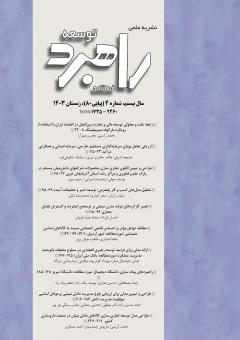طراحی مدل توسعه تجاری سازی کالاهای دانش بنیان در صنعت داروسازی کشور
محورهای موضوعی :حجت کریمی 1 , داریوش جمشیدی 2 , احمد عسکری 3
1 - دانشجوی دکتری مدیریت بازرگانی گرایش بازاریابی، واحد بین الملل کیش ،دانشگاه آزاد اسلامی واحد بین الملل ، کیش، ایران.
2 - گروه مدیریت بازرگانی
3 - استادیار گروه مدیریت ، واحد لامرد ،دانشگاه آزاد اسلامی ، لامرد ، ایران.
کلید واژه: کلیدواژه: توسعه تجاری سازی, کالا, دانش بنیان, صنعت داروسازی کشور.,
چکیده مقاله :
زمینه: مدل توسعه تجاری سازی کالاهای دانش بنیان در صنعت داروسازی کشور، به طراحی چارچوبی اشاره دارد که برای تبدیل فناوری ها و کالاهای دانش بنیان در صنعت داروسازی به محصولات تجاری پیشرفته و سودآور استفاده می شود. این مدل شامل مراحل و روش هایی است که برای تحقق مزیت های رقابتی، عملکرد مالی قوی و رشد پایدار در بازارهای داخلی و خارجی لازم است. هدف: هدف از این پژوهش طراحی مدل توسعه تجاری سازی کالاهای دانش بنیان در صنعت داروسازی کشور مورد بررسی قرار گرفته است. روششناسی: بدین منظورتعیین و انتخاب شاخص ها با بهره گیری ادبیات تحقیق و مصاحبه اکتشافی به همراه نظر سنجی از 11 نفر از شرکت های داروسازی انجام شده است، از روش نمونه¬گیری هدفمند و با نمونه¬گیری نظری به اشباع نظری رسیده و سپس اطلاعات به دست آمده با استفاده از روش تحلیل مضمون مورد بررسی و مدل پاردایمی ساخته شده است که توسط نرم فزار Maxqda20مورد تحلیل قرار گرفته است. یافتهها: یافته¬های پژوهش نشان داد از شناسایی عوامل طراحی مدل توسعه تجاری سازی کالاهای دانش بنیان در صنعت داروسازی کشور است. نتیجهگیری:طراحی مدل توسعه تجاریسازی کالاهای دانشبنیان در صنعت داروسازی کشور نشان میدهد که همافزایی بین نهادهای تحقیقاتی، صنعت و دولت نقش کلیدی در موفقیت این فرآیند دارد. این مدل با تأکید بر تقویت زیرساختهای تحقیقاتی، تسهیل فرآیندهای قانونی و حمایت مالی از شرکتهای دانشبنیان، میتواند به افزایش رقابتپذیری محصولات دارویی داخلی در بازارهای جهانی منجر شود.
Hojjat Karimi Dariush Jamshidi Ahmad Askari Abstract Background:The model for the development of commercialization of knowledge-based products in the pharmaceutical industry of the country refers to the design of a framework used to transform technologies and knowledge-based products in the pharmaceutical industry into advanced and profitable commercial products. This model includes stages and methods necessary to achieve competitive advantages, strong financial performance, and sustainable growth in domestic and international markets. Objective:The purpose of this research is to design a model for the development of commercialization of knowledge-based products in the pharmaceutical industry of the country. Methodology:To this end, the identification and selection of indicators were carried out using research literature and exploratory interviews, along with a survey of 11 individuals from pharmaceutical companies. Targeted sampling and theoretical sampling were used to reach theoretical saturation. The collected data were then analyzed using thematic analysis, and a paradigmatic model was constructed, which was analyzed using Maxqda20 software. Findings:The findings of the research revealed the identification of factors for designing a model for the development of commercialization of knowledge-based products in the pharmaceutical industry of the country. Conclusion:The design of the model for the development of commercialization of knowledge-based products in the pharmaceutical industry of the country indicates that synergy among research institutions, industry, and the government plays a key role in the success of this process. This model, with an emphasis on strengthening research infrastructure, facilitating legal processes, and providing financial support to knowledge-based companies, can lead to increased competitiveness of domestic pharmaceutical products in global markets.
